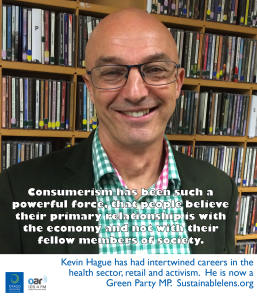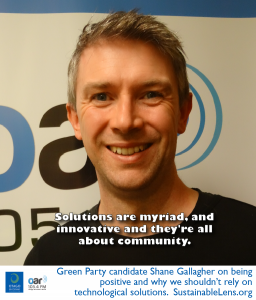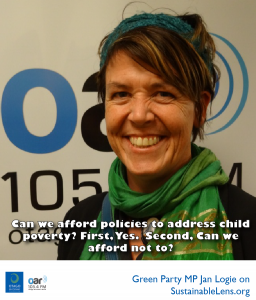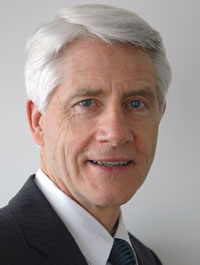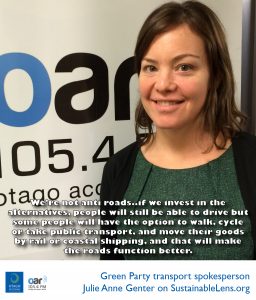
I realised that there’s not much you can do to improve things (in urban planning) if you don’t address transport…it affects many of the public spaces between the buildings, it impacts on the energy we have to use to get from place to place, and it also has a big impact on household expenses.
Julie Anne Genter is a Member of Parliament for the Green Party. Amongst other roles, she is spokesperson for Transport.
Talking points
Transport is the easy win:win the thing we can change that would have a positive economic impact, positive impacts for society, and very positive impacts for the environment
How can walking, cycling and public transport possibly be more expensive than every household being utterly dependent on two or more cars?
“No blood for oil”…I was 12,and that made perfect sense to me, we shouldn’t be going to war, and certainly not for oil.
It would be useful to have more critical training. In politics there’s a lot of logical fallacies being used and they’re repeated in the mainstream media. It’s not that hard to pick it apart with training in critical thinking, but if people haven’t had that training there’s no reason people should be able to innately do it.
(On the argumentative theory of reason) Most people are quite bad at abstract reasoning…reason isn’t something that people use individually, it’s something that functions in a collective, it works through argument.. .people are really good at arguing their case, they’ve already got a position and they’re really good at finding arguments to support their position – whether they are logical or not – so reason operates as part of a group, we argue and debate, it is the wisdom of the crowds that sorts out which argument is best and makes the right decision.
Maybe what we need is critical thinking, but on the other hand maybe what we need is to be less afraid of having open debates…maybe that’s what’s missing in our democracy is having more people engaging in debate.
(one of the four values of the Green Party charter) appropriate decision making…decisions will be made at the lowest level at which they affect people…it’s important for all of the different points of view to be represented in political debate and that we have to be willing and open minded about listening to each other in order for us to make good decisions as a society…that doesn’t happen in parliament, the political parties already have their positions decided and most of the debate is just for show.
We’re not really listening, it’s like one party gets in power and they do whatever they want, then another party gets in power and does something different, but aren’t collectively having a debate and making decisions based on the information that’s available to all the different citizens of New Zealand, and I think we’d make better decisions if we were able to do that.
Spending almost half the entire transport budget on 4% of vehicle trips is a huge opportunity cost – those projects aren’t going to substantially reduce transport costs for households or business, they’re not going to reduce congestion in the medium or even short term…dumping more cars onto congested local roads…and it’s so crazy…spending this much money on new highways when we know highways don’t reduce congestion, they don’t increase economic productivity…what we could buy with 12 billion dollars to invest in the rail network, in public transport, in walking and cycling in towns and cities…we could have a much more balanced transport system.
It’s very strange that the rail network is expected to be funded by the profit from a rail company while we’re dumping billions of dollars on the state highway network.
the government treats them as two separate things…despite there being obvious benefits for the road network from improvements in the rail network.
Very few people benefit from the status quo
Getting more people onto public transport, walking and cycling is great for freeing up the roads for people who need to drive, including the truck drivers.
It’s a huge opportunity, it’s going to be so easy to do things smarter because we’re doing them so stupidly at the moment. What a win:win, we could spend the same amount of money on transport from a government perspective but spend a lot less in terms of vehicles and fuel, get massive health benefits…
When you look at the benefits of reducing vehicle dependency, it can be justified on economic grounds alone on the money your save, but also there’s the health benefits, benefits in terms of reducing air pollution and water pollution, benefits in terms of using land more efficiently, safety benefits…
(do we have the population density?) We had high functioning rail network and public transport before when we had a smaller population, more spread out…being a long skinny (country) lends itself to rail
Our system is built now for the car, and that has spread things out.
We don’t have to keep doing it…if we invest in the alternatives, people will still be able to drive but some people will have the option to walk, cycle or take public transport, and move their goods by rail or coastal shipping, and that will make the roads function better and people will make different location decisions.
We’re not talking about replacing the car, about replacing every car trip people make now with a public transport trip or a bicycle trip, it’s about getting it from 8 or 9 out of 10 to maybe 5 or 6 out of 10 – an incremental process. But that incremental change of getting back in balance requires a total revolution in funding and policy because otherwise we’re going to keep going in the car dependent direction.
People everywhere systematically overestimate the importance of car parking and car access to their businesses
It’s either a vicious or virtuous cycle and we can quite easily break the vicious cycle of car dependence because we’re the ones who started it….transport and planning bureaucrats who made the decision to do everything around cars
Electric vehicles solves the fuel problem but not everything else
(about the response to banners on the beach protesters being dismissed because they drove their car there) their argument is that you can’t argue for things to be different inf you are living in the world as it currently is – I don’t think that is a good argument, it says ‘if you want things to be different then you should somehow make the different’, but that’s what people are trying to do. I don’t blame people from using a car because we’ve created an environment where it is pretty difficult to do anything but use a car. That’s why I’m advocating for government to change its funding and policies to make it easier for more people not to rely on a car.
People are saying they want other choices, but they can’t go and live in a cave somewhere and change the world.
The only place where people call the Greens crazy is the National Party in parliament..they repeat this point over and over again in order not to have to engage in a proper debate with us, it somewhat works but it’s starting to make them look bad – for example over the climate plan…they called us “off the planet crazy” but they haven’t got a real argument.
I’m not anti-car and there’s nothing anti-car about our policies, this is going to be good for people that need to drive… we plan to increase road maintenance, increase the programme of road safety works, have a more ambitious road safety target…
Resources
Green Charter
Green’s Climate protection plan


